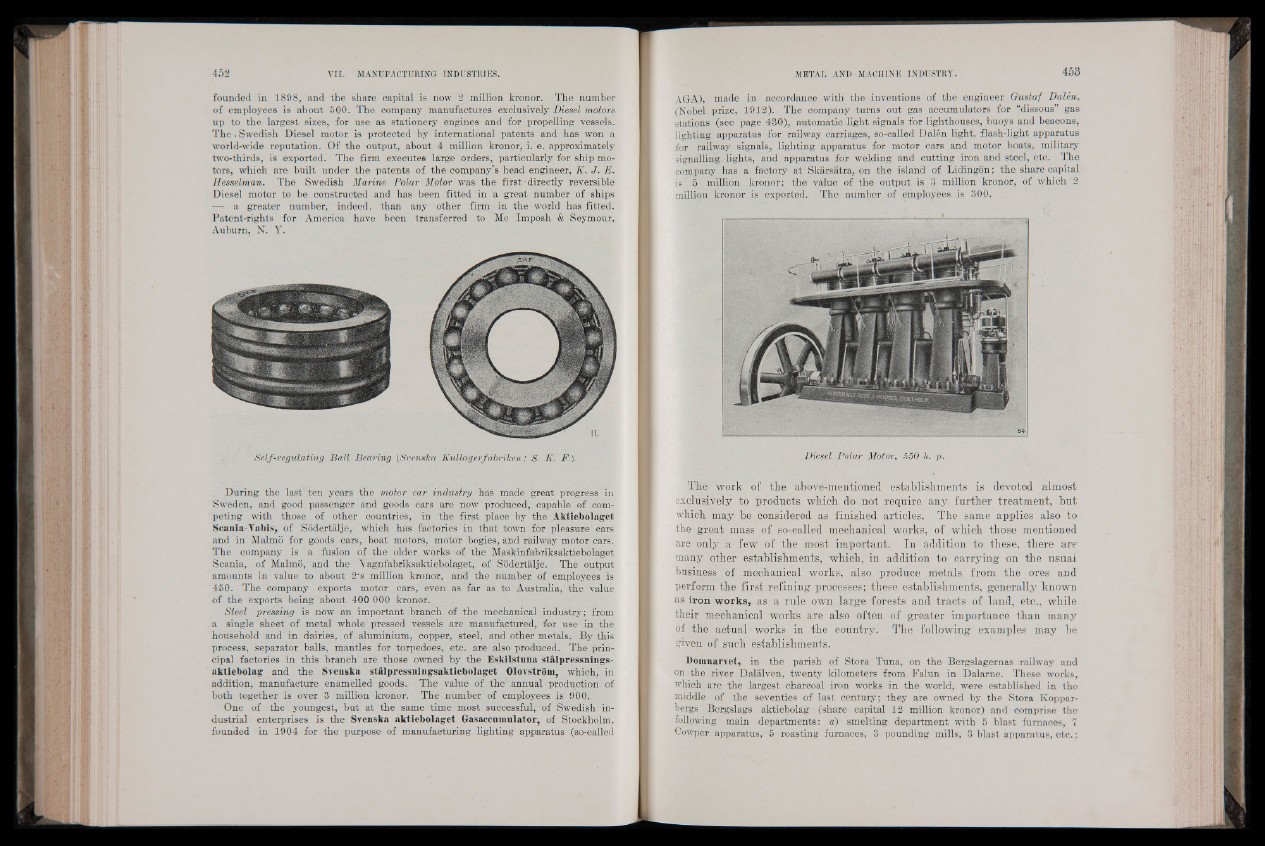
founded in 1898, and the share capital is now 2 million kronor. The number
of employees is about 500. The company manufactures exclusively Diesel motors
up to the largest sizes, for use as stationery engines and for propelling vessels.
T h e . Swedish Diesel motor is protected by international patents and has won a
world-wide reputation. Of the output, about 4 million kronor, i. e. approximately
two-thirds, is exported. The firm executes large orders, particularly for ship motors,
which are built under the patents of the company’s head engineer, K. J. E.
Hesselman. The Swedish Marine Polar Motor was the first'directly reversible
Diesel motor to be constructed and has been fitted in a great number of ships
- a greater number, indeed, than any other firm in the world has fitted.
Patent-rights for America have been transferred to Me Imposh & Seymour,
Auburn, N. Y.
Self-regulating Ball Bearing (Svenska Kidlagerfábriken ; S- K. F.).
During the last’’ten years the motor car industry has made great progress in
Sweden, and good passenger and goods cars are now produced, capable of competing
with those of other countries,. in the first place by the Aktiebolaget
Scania-Vabis, of Sodertalje, which has factories in that town for pleasure cars
and in Malmo for goods cars, boat' motors, motor bogies, and railway motor ears.
The company is a fusion of the older, .works of the Maskinfabriksaktiebolaget
Scania, of Malmo, and the Y agnfabriksaktiebolaget, of Sodertalje. The output
amounts in value to about 2 ‘s million kronor, and the number of employees is
450. The company exports motor cars, even as far as to Australia, the value
of the exports being about 400 000 kronor.
Steel pressing is now an important branch of the mechanical industry; from
a single sheet of metal whole pressed vessels are manufactured, for use in.the
household and in dairies, of aluminium, copper, steel, and other metals. By this
process, separator balls, mantles for torpedoes, etc. are also produced. The principal
factories in this branch are those owned by the Eskilstnna st&lpressnings-
aktiebolag and the Svenska st&lpressningsaktiebolaget Olovstrom, which, in
addition, manufacture enamelled goods. The value of the' annual production of
both together is over 3 million kronor. The number of employees is 900.
One of the youngest, but at the same time most successful, of Swedish industrial
enterprises is the Svenska aktiebolaget Gasaccumulator, of Stockholm,
founded in 1904 for the purpose of manufacturing lighting apparatus (so-called
\Q A ) , made in accordance with the inventions of the engineer Oustaf Dalen,
(Nobel prize, 1912). The company turns out gas accumulators for “dissous” gas
stations (see page 430), automatic light signals for lighthouses, buoys and beacons,
lighting apparatus for railway carriages, so-called Dalen light, flash-light apparatus
for railway signals, lighting apparatus for motor cars and motor boats, military
signalling lights, and apparatus for welding and cutting iron and steel, etc. The
company has a factory at Skarsatra, on the island of Lidingon; the share capital
is 5 million kronor; the value of the output is 3 million kronor, of which 2
million kronor is exported. The number of employees is 300.
Diesel Polar Motor, 550 h. p.
The work of the above-mentioned establishments is devoted almost
exclusively to products which do not require any further treatment, but
which may be considered as finished articles. The same applies also to
the great mass of so-called mechanical works, of which those mentioned
are only a few of the most important. In addition to these, there are
many other establishments, which, in addition to carrying on the usual
business of mechanical works, also produce metals from the ores and
perform the first refining processes; these establishments, generally known
as iron works, as a rule own large forests and tracts of land, etc., while
their mechanical works are also often of greater importance than many
of the actual works in the country. The following examples may be
given of such establishments.
Domnarvet, in the parish of Stora Tuna, on the Bergslagernas railway and
on the river Dalâlven, twenty kilometers from Falun in Dalarne. These works,
which are the largest charcoal iron works in the world, were established in the
middle of the seventies of last century; they are owned by the Stora Koppar-
bergs Bergslags aktiebolag (share capital 12 million kronor) and comprise the
following main departments: a) smelting department with 5 blast furnaces, 7
Cowper apparatus, 5 roasting furnaces, 3 pounding mills, 3 blast apparatus, etc. ;